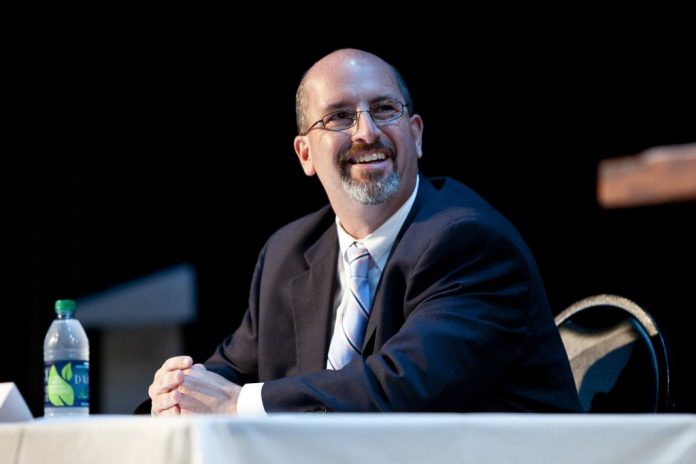Bill Rubin debates City Councilman Brian O’Neill, an eight-term Republican at the 10th Councilmanic District debate on Monday, Oct. 24 at The Klein JCC.
Kevin Cook/for the Times
The candidates in the 10th Councilmanic District debated on Monday night, clashing on issues such as the Deferred Retirement Option Plan, the use of city-owned vehicles, outside employment and the city pension fund.
City Councilman Brian O’Neill, an eight-term Republican, and Democrat Bill Rubin debated for an hour in the auditorium of the Klein JCC. The forum, sponsored by the Northeast Times and a number of other organizations, was moderated by Rachel Lawton, president of the League of Women Voters of Philadelphia.
The candidates answered numerous questions and gave closing statements, interrupted by applause from partisans and one woman who stood up to complain about benefits paid to new city employees.
Rubin answered, “Absolutely not,” on questions tailor-made for him about whether he would accept a city car and hold another job while serving in Council.
“I will not take one when I’m elected,” he said of a car.
O’Neill explained that there are more than 4,000 cars issued to city employees, adding that a vehicle is helpful when traveling back and forth between City Hall and the Far Northeast.
“I need it more than anybody,” he said.
O’Neill has told Mayor Michael Nutter that he will give up the car when hizzoner does.
“I’m still waiting for him to call me back,” the councilman said.
O’Neill did indicate that, if the Nutter administration set a policy prohibiting the use of city-owned cars by employees, he’d be glad to comply.
“I’d be in the front of the line with my keys,” he said.
As for outside employment by Council members, Rubin mentioned his opponent’s somewhat lucrative work as a lawyer. The annual salary of a Council member is about $120,000, with those in leadership positions making more.
“If you can’t make ends meet, then there’s a problem,” Rubin said.
O’Neill, leader of Council’s three-member Republican minority, said he works “more than full time” as a councilman. He recalled the 1979 race, when he told voters of Democratic Councilman Mel Greenberg, “If you’ve seen, heard or met him, vote for him.”
O’Neill argued that his law degree has allowed communities to win more than 99 percent of cases in front of the Zoning Board of Adjustment.
“I have been successful in thousands of zoning cases,” he said.
There’s a big Democratic voter-registration advantage in the district, but most observers consider O’Neill the favorite because of his name recognition, incumbency and bigger campaign war chest.
The wild card is DROP, the city’s controversial retirement-incentive program. Council created it for city workers, but a number of elected officials — backed by rulings from the city solicitor — have taken advantage of it. Some officials have even run for office after “retiring.”
“It was not ever intended for elected officials,” Rubin said, explaining that DROP was created, in part, to give city departments a better idea of when employees planned to retire.
Rubin conceded that the participation by elected officials in DROP is legal, but not necessarily moral or ethical.
“We saw in the primary, the voters spoke,” he said.
City Councilman Frank Rizzo and City Commissioner Marge Tartaglione sought re-election this year despite being enrolled in DROP, but they were defeated in the primary.
Rubin is running a cable television commercial that shows O’Neill pictured with Councilwoman Marian Tasco, who is expected to run for Council president despite the fact that she is enrolled in DROP. Tasco will collect $478,057 in retirement money in January but remain on Council and continue to collect her full salary.
An announcer calls Tasco his “DROP ally,” shows a bag of money falling into O’Neill’s hands and declares that he voted for DROP so he could “pocket half-a-million in cash.”
O’Neill said his opponent is “spreading a lie.”
“I’m never going to take DROP,” he said.
O’Neill wondered why Rubin, a longtime employee of the commissioners’ office, never mentioned Tartaglione’s role in DROP and is focusing on the issue only after two incumbents were defeated because of it.
“He got religion. All of a sudden, it’s the worst thing in the world,” the councilman said.
The incumbent and challenger were asked about their vote for Council president.
“Without a doubt, I will not vote for Marian Tasco,” Rubin said.
“I’m concentrating on my election, not the next election,” O’Neill said.
As for the city’s chronically underfunded pension system, Rubin blamed O’Neill and Council for underfunding it for years and recalled the stock market crash of 2008.
O’Neill blamed Rubin, who served as vice chairman of the Philadelphia Board of Pensions and Retirement.
“I’m no pension expert,” the incumbent said, “but apparently my opponent isn’t, either.”
For 28 years, constituents were able to see O’Neill or his staff on Monday nights at various locations. Three years ago, he opened a district office.
“I wish I had more than one,” he said.
Rubin promised to open a district office, “where I am actually there.” The office would feature language interpreters for the district’s large Russian and Indian population. The challenger also wants to hold Council meetings at nights, on weekends and in neighborhoods.
In his next term, O’Neill’s goals include strengthening local public schools. He pointed to Parkwood’s Stephen Decatur Elementary School, where students used to be bused in from other neighborhoods. Today, it is a community school with strong parental involvement and rising test scores. The councilman favors breaking the School District of Philadelphia into smaller districts and creating an elected school board.
Rubin said he is looking forward to becoming the seventh new councilman next year to bring energy and excitement to the 17-member Council. His year-long campaign has already handled constituent requests.
“They’ve seen more service in the last ten months than in the last ten years,” he said. ••
Reporter Tom Waring can be reached at 215–354–3034 or [email protected]





